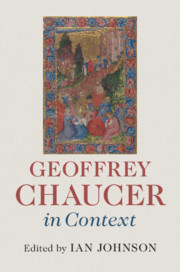Book contents
- Geoffrey Chaucer in Context
- Geoffrey Chaucer in Context
- Copyright page
- Contents
- Illustrations
- Contributors
- Abbreviations
- Introduction
- Part I Chaucer as Context
- Part II Books, Discourse and Traditions
- Part III Humans, the World and Beyond
- Part IV Culture, Learning and Disciplines
- Part V Political and Social Contexts
- Chapter 34 Dissent and Orthodoxy
- Chapter 35 The Church, Religion and Culture
- Chapter 36 England at Home and Abroad
- Chapter 37 Chaucer’s Borders
- Chapter 38 Rank and Social Orders
- Chapter 39 Chivalry
- Chapter 40 Chaucer and the Polity
- Chapter 41 The Economy
- Chapter 42 Towns, Villages and the Land
- Chapter 43 London’s Chaucer
- Chapter 44 Everyday Life
- Chapter 45 Household and Home
- Chapter 46 Marriage
- Chapter 47 Dress
- Part VI Chaucer Traditions
- Further Reading
- Index
Chapter 35 - The Church, Religion and Culture
from Part V - Political and Social Contexts
Published online by Cambridge University Press: 24 June 2019
- Geoffrey Chaucer in Context
- Geoffrey Chaucer in Context
- Copyright page
- Contents
- Illustrations
- Contributors
- Abbreviations
- Introduction
- Part I Chaucer as Context
- Part II Books, Discourse and Traditions
- Part III Humans, the World and Beyond
- Part IV Culture, Learning and Disciplines
- Part V Political and Social Contexts
- Chapter 34 Dissent and Orthodoxy
- Chapter 35 The Church, Religion and Culture
- Chapter 36 England at Home and Abroad
- Chapter 37 Chaucer’s Borders
- Chapter 38 Rank and Social Orders
- Chapter 39 Chivalry
- Chapter 40 Chaucer and the Polity
- Chapter 41 The Economy
- Chapter 42 Towns, Villages and the Land
- Chapter 43 London’s Chaucer
- Chapter 44 Everyday Life
- Chapter 45 Household and Home
- Chapter 46 Marriage
- Chapter 47 Dress
- Part VI Chaucer Traditions
- Further Reading
- Index
Summary
The chapter examines Chaucer’s attitude to the Church, and to the demands of living the Christian life in fourteenth-century England. The seeming double-mindedness of his scathing criticism of religious professionals, and yet his deeply held faith, arose from a desire to ask what it is to be a Christian. Taking up Chaucer’s own quest, the chapter asks how Christian was late medieval society, what was required of the ordinary parishioner in terms of practice and belief, and what opportunities were available for people to go beyond these basic expectations in their efforts to attain salvation? There were choices to be made but also many limitations upon the ordinary believer. So not everyone agreed on how best to reach heaven, and there were cultural as well as social gulfs that undermined the ideal of a unified Church. These were problems of which Chaucer seems to have been acutely aware.
- Type
- Chapter
- Information
- Geoffrey Chaucer in Context , pp. 301 - 307Publisher: Cambridge University PressPrint publication year: 2019

